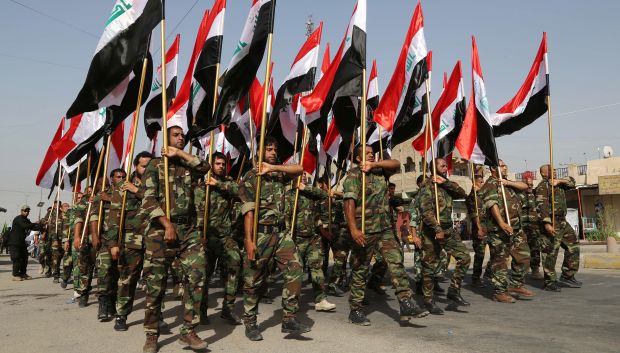
Volunteers in the newly formed “Peace Brigades” participate in a parade in the Shi’ite stronghold of Sadr City, Baghdad, on June 21, 2014. (AP Photo/Karim Kadim)
Anbar, Reuters—Sunni fighters seized a border post on the Iraq–Syria frontier on Saturday, smashing a line drawn in 1932 by colonial powers and linking hundreds of miles of land they control to create an Islamic Caliphate from the Mediterranean Sea to Iran.
The militants, led by the Islamic State in Iraq and Syria (ISIS), first moved into the nearby town of Al-Qaim on Friday, pushing out security forces, the sources said.
Once border guards heard that Al-Qaim had fallen, they left their posts and militants moved in, the sources said.
Sameer Al-Shwiali, media adviser to the commander of Iraq’s anti-terrorist squad, told Reuters that the Iraqi army was still in control of Al-Qaim.
Al-Qaim and its neighboring Syrian counterpart, Al-Bukamal, are on a strategic supply route. A three-year war in Syria has left most of eastern Syria in the hands of Sunni militants, including the Al-Bukamal–Qaim crossing.
With stunning speed, ISIA, an offshoot of Al-Qaeda, has captured swathes of territory in northwest and central Iraq, including the second city, Mosul. They have seized large amounts of weaponry from the fleeing Iraqi army and looted banks.
The fighting has divided Iraq along sectarian lines. The Kurds have expanded their zone in the northeast to include the oil city of Kirkuk, which they regard as part of Kurdistan, while Sunnis have taken ground in the west.
The Shi’ite-led government has mobilized militia to send volunteers to the front lines.
President Barack Obama has offered up to 300 US special forces advisers to help the Iraqi government recapture territory seized by ISIS and other Sunni armed groups across northern and western Iraq.
But he has held off granting a request for air strikes to protect the government and renewed a call for Iraq’s long-serving Shi’ite prime minister, Nuri Al-Maliki, to do more to overcome sectarian divisions that have fueled resentment among the Sunni minority.
In Baghdad’s Shi’ite slum of Sadr City, thousands of fighters wearing military fatigues marched through the streets.
They carried rocket-propelled grenades, semi-automatic rifles and trucks had mounted long-range rockets, including the new 3-meter “Muqtada 1” missile, named after Shi’ite cleric Moqtada Al-Sadr, who has tens of thousands of followers.
Sadr has yet to throw his fighters into the recent wave of fighting but has criticized Maliki for mishandling the crisis.
“These brigades are sending a message of peace. They are the brigades of peace. They are ready to sacrifice their souls and blood for the sake of defending Iraq and its generous people,” a man on a podium said as the troops marched by.
